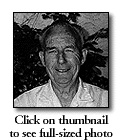Judson P. (Jud) Bradshaw
San Diego State University, Extension Division, Instructor, Adult Education, 1974-80
San Diego Community College District, Director, Adult & Continuing Education, 1970-74
San Diego Unified School District, Adult School Principal, 1950-70
President, California Community College Continuing Education Association, 1973-74
President, National Association of Public and Continuing Adult Educators, 1972-73
President, State, California Council for Adult Education, 1962-63
Why California has strong adult education.
Excerpt from an interview with:
JUDSON P. BRADSHAW by LINDA L. WEST
November 21, 1992
San Diego, California
WEST:
I was interested about something you said about California having a well
developed adult ed program for a long time, compared with some of the other
states.
BRADSHAW:
That's correct.
WEST:
And wondering, what have you observed, as far as California's leadership with
the other states?
BRADSHAW:
Well, I think the very fact that so many of the presidents of the national
association have come from California would speak for itself. Our first
president was from California, of the NAPSAE, and there have been presidents
every few years because of this. And the membership, of course, is large from
California. Although the East Coast has a fairly good-sized membership, the
middle areas don't have as much, nor do some of the smaller states have as much
representation. It's because of the number of people involved, the voting
membership.
In California, I think that we had from the beginning a large number of foreign-born people. They settled in California, first of all, because it was a developing area and there was a lot of jobs available. We had first the gold mines, and that brought people from all over the world to work in the gold mines. Then we had the railroads developing across the country, and again there was a lot of work. Then we had the development of agriculture, which was great, and the people coming in to help with the agricultural thing. All of these people came from foreign countries, and a lot of them from, for instance, the Orient came in to do the gold mines, from South America into the gold mines, and then the Union [Pacific] Railroad brought in scads of Orientals to work on the railroads, they built those. These people had to have some sort of English training. They couldn't get along with the Americans if they didn't learn English. It's interesting, the first adult school in California came as a result of the railroad people saying, "We've got to teach these Chinese how to understand English directions. Could you set up ... You've got a classroom here in San Francisco, nobody is using it at night, let's take the Chinese in there and teach them English."
WEST:
Yes, at Saint Mary's.
BRADSHAW:
And they did it, and it was not only them, but what happened was, of course,
that some of the other people who wanted to learn English but weren't working
for the railroad said, "I want it, too." And so it spread. And adult education
has always been strong in California because of- I think a good deal of
it--because of the foreign-born element that's come in to fill in: Latinos from
the south, and [Orientals] from the ... and then some of the other
nationalities from all the rest of the world. It's always been a good mixture
here in California.
WEST:
So there has been a need, and that was the reason for the strong program.
BRADSHAW:
Tremendous, and therefore the program developed.

